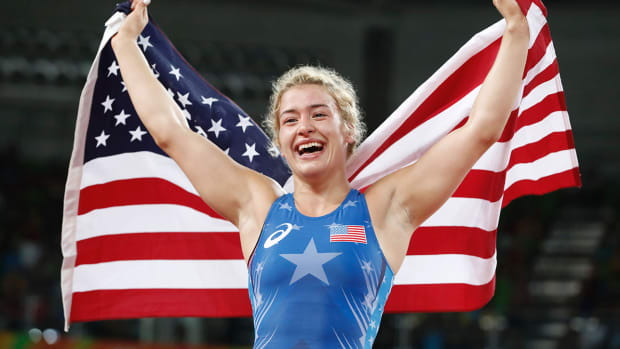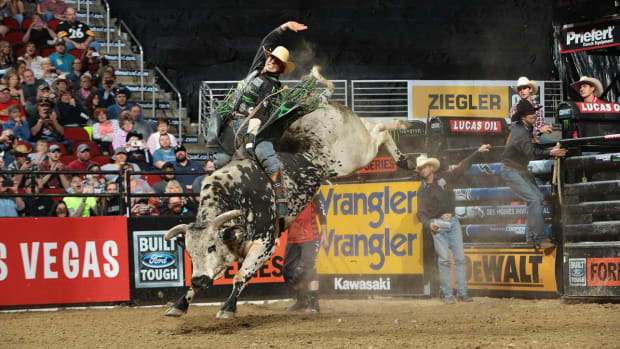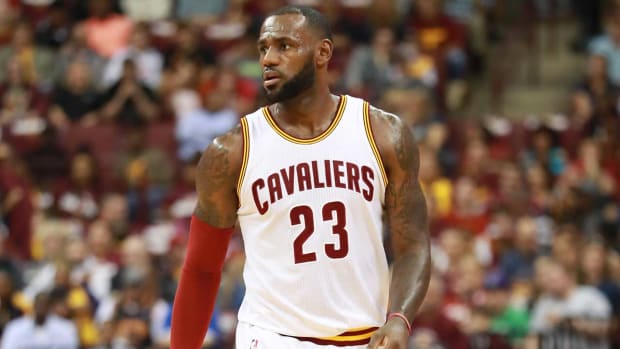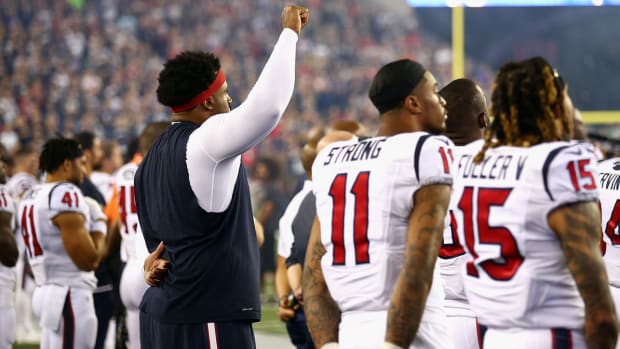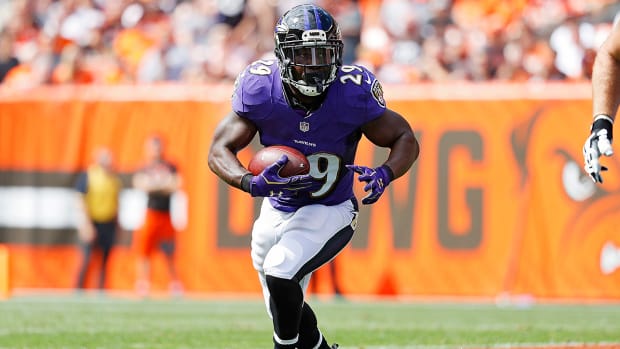At 40, Alex Rodriguez leading Yankees back toward the postseason
Watch closely and it’ll happen again.
Alex Rodriguez will launch another towering home run — it might be tomorrow, or it might be next season — with that loopy, effortless swing seemingly appropriated from a backyard Wiffle ball game, and as he trots around the bases just like 680-something times before, he’ll round third base and ... boom! His oversized, white-gloved hand — evoking a pinstriped Bugs Bunny, or maybe a 6'3" Mickey Mouse — will come down hard and fast on the outstretched hand of a third base coach for an eternally awkward high five.
Cue the flashbacks. Like clockwork. Over a decade ago, that same downward slap, that same white-gloved hand, ignited the spark that would precipitate his downfall. In Game 6 of the 2004 ALCS, with the Yankees down 4–2 in the eighth inning and Derek Jeter on first, Rodriguez hit a slow roller down the first base line that was easily fielded by Red Sox pitcher Bronson Arroyo. Just prior to being tagged out in the base path, A-Rod swatted the ball away from Arroyo’s glove, causing it to roll behind first base. Jeter scored, A-Rod went to second, and Yankee Stadium erupted.
A-Rod, of course, was called out for interference, and his feigned innocence — standing on second in disbelief before pleading with the umpires that he was only pumping his arms while running — can now be viewed as a precursor to what would come later.
Who, me? Slapping at the ball? Who, me? Taking steroids? Who, me? Associating with what trainer? What Biogenesis scandal?
The play was one of many breaking points in New York’s historic 2004 collapse, but it seemed to symbolize something more sinister for the $250 million star. For many, the moment validated long-held suspicions: A-Rod wasn’t clutch; A-Rod couldn’t handle the pressure of the Big Apple; A-Rod was a cheater at heart. With this one lapse in reason, he foisted himself squarely on the other side of the fence—for Yankee fans and casual observers alike. And nothing — not the three MVP awards, not the .455/.500/1.000/1.500 batting line and postseason MVP award in ’09 — could ever make it go away.
Since then, Rodriguez’s playoff struggles have been as well documented as they were spectacular: a combined 3-for-29 in successive first-round losses in ’05 and ’06; 2-for-18 against the Tigers in ’11; a total of six postseasons with an average under the Mendoza line. Fairly or not, he became the fall guy for New York’s decade-long slide toward mediocrity. As a kind of final karmic comeuppance, A-Rod’s body began to break down. His stats dipped. He was disgraced like no one before him, hit with the biggest suspension in the history of Major League Baseball.
That was it — the ending he, and we, all deserved.
Wasn’t it?
*****
There was a time, not very long ago — six months ago? — that it was conceivable that we’d never see Alex Rodriguez play in the majors again. He was, like so many controversial sports figures before him, expected to crumble in charred shame, and fade from sight forever. Barry Bonds never played again after his contract with the Giants expired in 2007. After his retirement in 2001, Mark McGwire vanished from the public eye for the better part of eight years.
But A-Rod is doing more than merely playing. The once-unwanted pariah showed up for spring training in eye-popping shape, seemingly recovered from the various injuries that had plagued him over the years. Soon thereafter, the onetime wunderkind began ripping off home runs at an impossible pace. Turns out A-Rod, now on the precipice of 40, still had plenty of gas left in the tank.
In July, he hit three home runs in a game in Minnesota, all 420 feet or more. The next month, he registered his 25th career grand slam, adding to his most-ever total. During the first week of September, he tallied four dingers in five days. In a season where he’s slumped badly at times, Rodriguez still stands to finish finish with at least 33 home runs and 86 RBIs — easily his best numbers in five years.
His relationship with team ownership — to say nothing of the players themselves — is almost too awkward to contemplate. Owed $61 million, he couldn’t be released outright following his suspension. Infamously, the Yanks wouldn’t even mention him on Twitter during spring training, and have since refused to pay him for, or even recognize, certain milestones. This — a distant disdain that’s often bordered on outright hostility — for arguably the team’s most indispensable hitter.
All the while, Rodriguez has helped carry his charges toward their first postseason berth in three years. (The Yankees blew their first chance to clinch a postseason spot Wednesday night against Boston, but only need to win one game now to qualify.) He’s George Costanza at Play Now, showing up for work on a contract the Yankees have been trying to wriggle out of since ... what, 2012? You could almost see A-Rod, after bashing another home run in Tampa, phoning the main office and convulsing, “If Cashman needs me, you tell him I’LL BE IN THE DUGOUT!”
*****
Alex Rodriguez has more money, fame and success that most human beings could even dream about. He’s an international celebrity, the best hitter of his generation, and his career WAR of 118.8 is 16th best in Major League history, right between Lou Gehrig and Ted Williams. He has a ring, three MVP awards, and is finishing his 20th season in the big leagues by posting — for a 40-year-old — astronomical numbers.
He is also a cheater, and a liar, and not just in the reputed sense. It’s been proven. It cannot be denied. He’s admitted it, paid the price, made his apologies. Most of these stories? This is where they end. Not with a home-run bang, but a whimper, a whiff, a lonely walk away from the spotlight.
And that’s what makes A-Rod's final chapters so compelling. He was, and remains, flawed in a way that cannot be fixed by more money or steroids or rings — flawed within, like you and me and everyone else, only not really at all. He must fix himself; chase his demons; look into the mirror instead of kissing it. No matter what he does, A-Rod’s dirty laundry will hang for all to see — on TV, radio, the back pages of the New York Post — always waving, but never dried. And no matter how much good will he earns back, be it by dint of will or time alone, it can never be enough.
If baseball is great theater, A-Rod is the three-and-a-half hour movie that transfixes until the end. He’s the 700-page novel you cannot put down. Cameron Diaz fed him popcorn at the Super Bowl. He played with Goose Gossage on the Mariners. He actually was traded to the Red Sox in 2003 before it was vetoed. (How’s that for a baseball history changeup?) Whatever happens this postseason and beyond — and with two more potentially drama-filled years left on his monstrous contract, it’s sure to be something. A-Rod cannot shed the labels. Sad as it is to say, he’ll never be a True Yankee.
That’s O.K., because what he’s become instead is much more interesting: A fallen baseball angel, wings ablaze, trying desperately to climb back above the clouds.
(Contributed to The Cauldron by Brian Lutz.)



